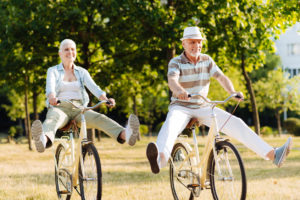 Whether you are caring for an elderly parent, or looking ahead to your own aging process, it is necessary to plan where and how you will live. This critical topic is essential to address and one that people often avoid. Our next few blogs will discuss aging-related issues in an effort to address the underlying issues of aging. The MacArthur Foundation Research Network on an Aging Society defines successful aging by three criteria: 1. avoidance of disease and disability; 2. maintenance of high cognitive and physical function; and 3.engagement with life. Read more to find out about the physical and cognitive functions in aging.
Whether you are caring for an elderly parent, or looking ahead to your own aging process, it is necessary to plan where and how you will live. This critical topic is essential to address and one that people often avoid. Our next few blogs will discuss aging-related issues in an effort to address the underlying issues of aging. The MacArthur Foundation Research Network on an Aging Society defines successful aging by three criteria: 1. avoidance of disease and disability; 2. maintenance of high cognitive and physical function; and 3.engagement with life. Read more to find out about the physical and cognitive functions in aging.
Physical Function in Aging
Many factors enter into healthy aging. Physical activity is a key in aging well, just as it was important in any phase of life. It can help to avoid disease and increase or at least maintain physical function. According to Harvard’s T.H. Chan School of Public Health: “Women who jogged or cycled about five hours per week almost doubled their chance of healthy aging. Two or more hours per week of brisk walking also improved the chances of a healthy old age. Perhaps most encouraging: Regardless of whether a woman was lean or over-weight, being physically active increased her odds of optimal health.” We have heard so much about the benefit of a physically active lifestyle, this probably comes as no surprise.
Cognitive Function and Engagement in Aging
In addition to physical activity, keeping the brain stimulated is important, too. Again, T.H. Chan explains: “Among women ages 60 to 70, lower levels of vitamin D in the blood of were associated with significantly worse cognitive function—such as memorization of words and numbers. The finding bolsters the theory that vitamin D, which is critically important for bone and muscle health and the prevention of falls, may also play a role in brain function.” Keeping our brains in good health is another factor in aging well. You may think doing puzzles and brain games is the solution here. And it certainly doesn’t hurt to stay mentally active. In addition to that, volunteering (or continuing to work) as we age is a great way to keep the mind active.
In 2009 the Journal of Gerontology did a study on members of the Experience Corps—a group of elderly volunteers. The women in the study “demonstrated increases in activity in several key areas of the brain, compared with those in the control group.” MRI scans measured increased flow of blood to the brain after the women’s time volunteering. Social interaction and meaningful work add to our longevity. Another positive benefit of the study was recorded in the students that the Corps volunteered with. Elementary school students who had the Corps members in their classrooms showed improved standardized reading scores, and fewer behavioral issues.
Taking the time to plan our aging is an important task, and is less daunting if we strip away society’s valuation of youth. Many cultures embrace the wisdom of years, and if we age with this idea in our focus, aging becomes the next natural phase in life where we can reap the benefits of our experience, instead of mourn the loss of our youth.






